Tag Archives: Massachusetts Division of Marine Fisheries
New England lobstermen threaten to sue feds over planned Massachusetts fishing closure
 NOAA is looking to permanently add a wedge between state and federal waters to an existing closure that stretches roughly 9,000 square miles off the Massachusetts coast, a measure feds have put in place to preserve the North Atlantic right whale. An emergency rule prohibited trap and pot fishery buoy lines on the wedge during the past two years, but the feds are looking to make the zone permanent and have the backing of the Massachusetts Division of Marine Fisheries. The proposed permanent expansion to the Massachusetts Restricted Area has caught lobstermen by surprise. Dustin Delano, chief operating officer of the New England Fishermen’s Stewardship Association, took exception to the “recklessness” of the proposal after an amendment was included in this year’s $1.7 trillion federal spending bill that looked to delay protections for the North Atlantic right whale by six years. >>click to read<< 11L27
NOAA is looking to permanently add a wedge between state and federal waters to an existing closure that stretches roughly 9,000 square miles off the Massachusetts coast, a measure feds have put in place to preserve the North Atlantic right whale. An emergency rule prohibited trap and pot fishery buoy lines on the wedge during the past two years, but the feds are looking to make the zone permanent and have the backing of the Massachusetts Division of Marine Fisheries. The proposed permanent expansion to the Massachusetts Restricted Area has caught lobstermen by surprise. Dustin Delano, chief operating officer of the New England Fishermen’s Stewardship Association, took exception to the “recklessness” of the proposal after an amendment was included in this year’s $1.7 trillion federal spending bill that looked to delay protections for the North Atlantic right whale by six years. >>click to read<< 11L27

Mass DMF’s On-Demand Fishing Gear Economic Modeling Report Released
The Massachusetts Division of Marine Fisheries (DMF) has completed the second phase of a two-year project, funded by the National Fish and Wildlife Foundation in partnership with the National Oceanic and Atmospheric Administration, to develop the first-of-its-kind evaluation of the operational costs of on-demand fishing gear technology by Massachusetts lobster fishermen. On-demand fishing gear, commonly known as ropeless fishing gear, replaces traditional vertical buoy lines, which can result in entanglements with marine mammals including North Atlantic right whales, with new gear retrieval and marking methods. Most on-demand fishing gear systems consist of submerged buoyancy devices that are activated using time-release mechanisms or acoustic signals transmitted from the surface. Click the links inside for the report. >click to read< 15:47
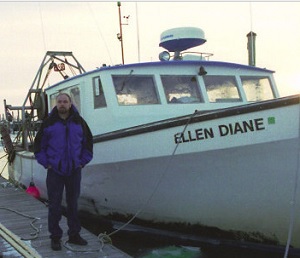
A grievous assault on the lobster resource
In recent years, the federal government in the form of the National Marine Fisheries Service has been expanding restrictions on fin fishermen throughout the U.S.,, The federal government allows each (lobster) fishermen a maximum of 800 traps when fishing in federal waters,,, I take no pleasure in writing this, but as a former New England Fishery Management council member, I feel bound to report a grievous assault on the lobster resource even though the council does not manage lobsters. The goal of writing the article is for the public to apply political pressure to force a solution. I realize that by submitting this request/complaint that I am opening myself up to possible retaliation on the water. I ask both the reader and bureaucracy to keep that in mind. >click to read< By David Goethel 10:30
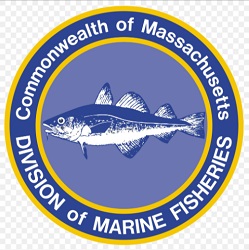
Time to apply for second round of CARES Act relief
The Massachusetts Division of Marine Fisheries mailed applications to seafood processers, wholesalers, commercial fishermen and aquaculture farmers on Tuesday, officially opening the state’s second round of CARES Act relief for fisheries. The funds are intended to mitigate the financial impacts on marine fisheries participants that suffered more than a 35% loss of revenue due to the pandemic. >click to read< 10:11

Massachusetts Launches ‘Ropeless’ Fishing Feasibility Study
The Massachusetts Division of Marine Fisheries (DMF) has launched a comprehensive scoping project to assess ‘ropeless’ fishing gear in the New England lobster fishery. A first of its kind on an accelerated timeline, the project will interview dozens of fishermen, technologists, policy experts, and scientists to fully evaluate the challenges and opportunities of the new gear type. The twelve-month project will evaluate fishing, legal, regulatory, technological challenges and opportunities of alternative lobster gear, which could reduce whale entanglements. >click to read< 12:47
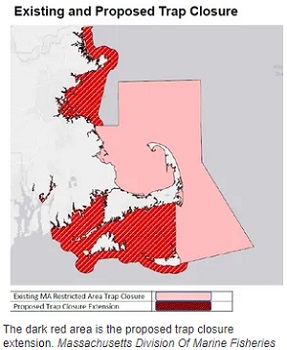
Livelihoods Threatened: Massachusetts lobstermen concerned about proposed regulations to protect whales
The Massachusetts Division of Marine Fisheries is proposing multiple amendments to current rules regulating fixed gear fisheries in an effort to protect an the North Atlantic right whale. Two local lobstermen say the proposed regulations threaten their livelihoods. “It’s gonna take roughly 30% of my income away from me,” said Dave Magee,,, Tom Tomkiewicz, a Fairhaven lobsterman, was not sold on the regulation, the regulations could cut 30% of his catch and up to 50% of his income,,, “All the bait guys, the marine supply guys, the shipyards, down to the restaurants we go to once or twice a week. We’re not going to be able to go because we won’t have the money. It’s going to affect a lot of people not even involved.” >click to read< 13:07
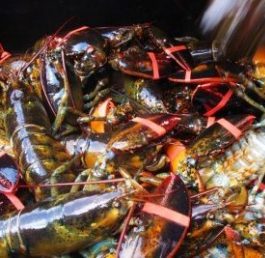
Massachusetts: Lobster season opens on time today after right whales move out of Cape Cod bay
Lobster season for the South Shore will begin as planned after endangered right whales, spotted in Cape Cod Bay, moved out of the area. The Provincetown Center for Coastal Studies previously estimated five whales, including two mother-and-calf pairs, were feeding in Cape Cod Bay, following an aerial survey on April 25. On Wednesday, the Center flew over the area again and found the whales has moved out of the bay and adjacent waters, the Massachusetts Division of Marine Fisheries said in an announcement Thursday afternoon. Although the season starts Friday, it is unlikely anyone will go out because of a forecast of high winds and bad weather. >click to read< 07:11
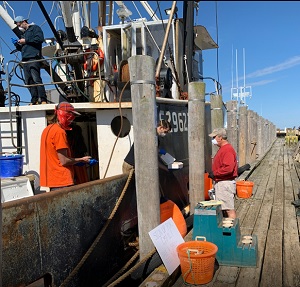
Unmoored and unsure, fishermen make do – Direct boat sales stem the tide for some.
Saturday, folks came to Menemsha to buy directly off the decks of local scallop boats. Business was brisk. Captain Sam Hopkins, aboard the Endurance, mongered to a steady queue of masked customers. Like the nearby Martha Rose, sea scallops off the Endurance sold for $15 per pound. “It was really nice to have some local support and have people who bought scallops right off the boat,” Hopkins said. Lobsterman Jason Gale has also turned to direct boat sales. From the deck of the Watch Out at Lake Street Landing he sold lobsters at $8 apiece, regardless of weight, on Saturday. Gale said he put a 10 lobster cap per customer and sold out. photos, >click to read< 15:59

Captains hope to replace coronavirus-related restaurant closures with direct customers
With their normal markets shrinking amid the coronavirus outbreak, South Coast fishermen are coming up with creative ways to sell their catch directly to consumers. Troy Durr created the Facebook group “South Coast Direct Source Seafood” “A lot of the fish houses are not buying from the boats, which left them in a situation to stop working or figure out their own way to sell,” (Troy) Durr said. The new way to sell is directly off their boats.,, Two boats went out on April 4 and sold lobsters at Union Wharf in Fairhaven for $6 per pound. “Today we had our first sell date,” Durr said in a post, “Two locally owned and operated lobster boats sold out of 600 lbs of lobsters in an hour and a half right at Union Wharf in Fairhaven.” >click to read< 17:03
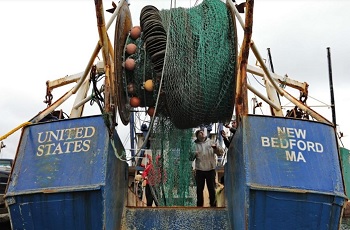
‘Too early to tell’ impact of Coronavirus on New Bedford fishing industry
Since the fishing industry was deemed part of the food supply chain, it is allowed to keep operating as an essential service under Gov. Charlie Baker’s stay-at-home advisory. “Immediate impacts have been minimal,” scalloper Eric Hansen said Thursday, “The market is a little bit depressed but nothing crazy. My bigger concern is the future, what’s going to happen in the next couple of months.” What worries Hansen about the future is the April 1 start of the next scalloping season, which will bring back scallopers that hadn’t been fishing because they used up their 2019 allocations. >click to read< 09:16
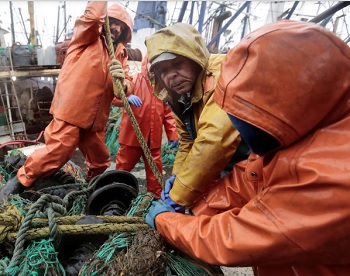
New rule allows NB and Southern NE fishermen to stop throwing away fish
The change, which is also expected to be made in Rhode Island and Connecticut, will allow fishermen to make one trip and then return to the three states and offload their catches without going back to sea after every offload,,The conditions are that they must have licenses to catch fluke in the states where they offload, and the states must be open for catching fluke. “We just want to go from state to state and not kill fish unnecessarily. Anyone who thinks fishermen don’t care about fish is wrong,” said Tony Borges, owner and captain of Sao Paulo, Photos, >click to read< 14:12

Gloucester: Lobstermen push against whale rules – ‘We’ve borne the brunt’
The evening began with a presentation from NOAA Fisheries’ Mike Asaro and Colleen Coogan that offered a historical backdrop on the status of the North Atlantic right whale stock and an explanation of the specific protectionist measures adopted in April by the Atlantic Large Whale Take Reduction Team.,, In Massachusetts and New Hampshire, lobstermen are tasked with reducing their vertical lines by 30 percent. In Maine, where there has been significant pushback by state officials and the nation’s most formidable lobster fleet, the target is significantly higher — 50 percent. Then came the comment period and the usual choosing of the sides. Photo’s, >click to read< 22:04
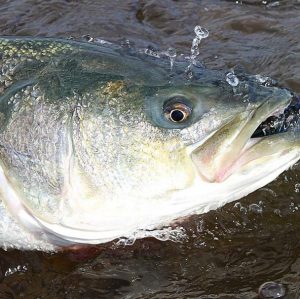
Massachusetts Enacts Striped Bass Conservation Regulations
The Massachusetts Division of Marine Fisheries has implemented two new striped bass conservation regulations aimed at reducing release mortality:
• Effective immediately, it is unlawful for any fisherman to gaff or attempt to gaff striped bass measuring less than 28 inches total length, and for a commercial fisherman fishing on an open commercial striped bass fishing day to gaff striped bass measuring less than 34 inches total length. >click to read<10:36 ‘There’s going to be no fish to fight over at all’: The Chesapeake Bay’s rockfish population is falling – >click to read<14:46
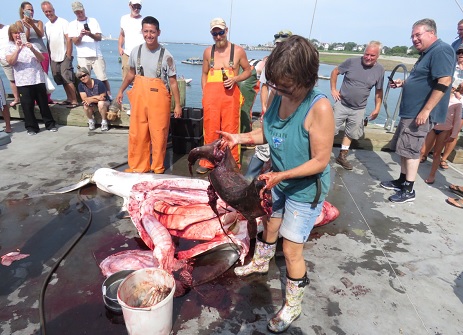
10-foot white shark accidentally caught off Massachusetts coast – Utilized for Science
The Atlantic White Shark Conservancy shared photos of a white shark, described as a 10-foot, 657-pound immature female, that was captured unintentionally on Saturday. The animal was caught and killed by a gill net, or a fishing device that hangs vertically to capture and trap fish by their gills. The shark was brought back to Scituate where scientists from the Massachusetts Division of Marine Fisheries and NOAA New England could take samples for research purposes. An online report from “Massachusetts Sharks” said researchers found the remains of seal and a striped bass in the shark’s stomach. >click to read<17:20

TRAP GEAR CLOSURE IN CAPE COD BAY EXTENDED THROUGH MAY 15TH
The Division of Marine Fisheries has enacted an emergency regulation to extend the Large Whale Trap Gear Closure for a portion of Cape Cod Bay through May 15th. Affected lobstermen may begin to set their gear on Wednesday May 16th. The duration of this closure extension may be shortened or further prolonged based on the results of continuing aerial surveys. This extended closure only applies within those waters of Cape Cod Bay south of 42° 08’ north latitude and those waters north of Cape Cod west of 70° 10’ west longitude (map). >click to read<16:06
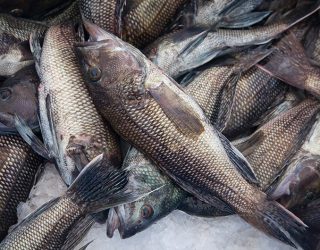
Proposed 2018 regulations on black sea bass and other commercially targeted fish covered at DMF public hearing.
With no proposed changes in conch fishing regulations on the agenda, the annual Division of Marine Fisheries (DMF) winter public hearing on proposed regulations was a relatively collegial gathering. A baker’s dozen of Island fishermen and stakeholders gathered at the Katharine Cornell Theater on Monday morning to weigh in on the potential changes the DMF is looking to implement in 2018. The main topic of conversation was changes to regulations for the commercial black sea bass fishery. >click to read< 19:00
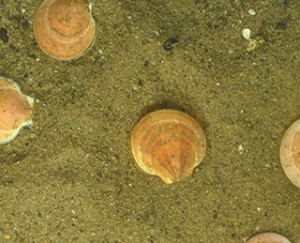
There won’t be new scallop fishing off the coast of Nahant after all
After hearing from more than 200 people who wrote letters demanding a reconsideration, the state has decided not to allow sea scallop dredging where it is currently prohibited off the coast of Nahant. “I am not anti-making-a-living,” said commercial lobsterman Justin Mahoney. “I have no problem with a fisherman making a living. I don’t like that we don’t know what the long term effects could be.” The State Division of Marine Fisheries proposed a pilot program that would allow dredging for scallops in areas where it is currently not allowed from February and March. >click here to read< 09:35
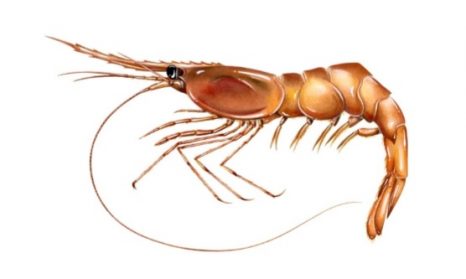
Request for Participant: 2018 Northern Shrimp RSA/Cooperative Winter Sampling Program – Massachusetts
The Atlantic States Marine Fisheries Commission (ASMFC) and the Massachusetts Division of Marine Fisheries (MA DMF) are seeking one Massachusetts (MA) trawl vessel/captain to collect northern shrimp samples in 2018 in accordance with the details below, fishing one trip per week for up to ten consecutive weeks. The participant will work with MA DMF staff to provide fresh shrimp samples from the vessel to the MA DMF Gloucester office each week. The participant will be allowed to land and sell up to 800 pounds of shrimp per trip. There shall be no other compensation. click here to read the press release 17:14 
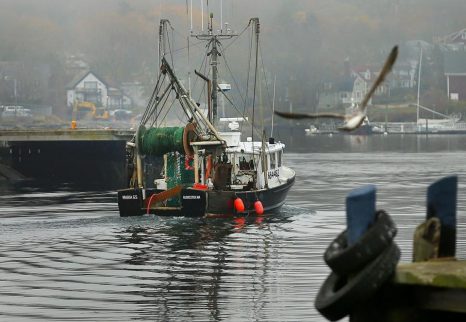
A milestone in the war over the true state of cod
For years, fishermen from Gloucester to New Bedford have accused the federal government of relying on faulty science to assess the health of the region’s cod population, a fundamental flaw that has greatly exaggerated its demise, they say, and led officials to wrongly ban nearly all fishing of the iconic species.The fishermen’s concerns resonated with Governor Charlie Baker, so last year he commissioned his own survey of the waters off New England, where cod were once so abundant that fishermen would say they could walk across the Atlantic on their backs. Now, in a milestone in the war over the true state of cod in the Gulf of Maine, Massachusetts scientists have reached the same dismal conclusion that their federal counterparts did: The region’s cod are at a historic low — about 80 percent less than the population from just a decade ago. continue reading the story here 08:07
Proposed regulations irk lobstermen
B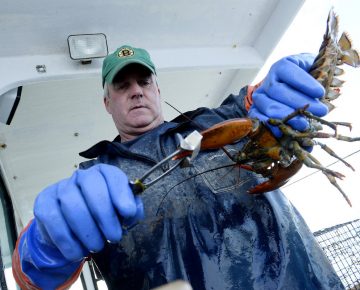 ay State lobstermen fear that a new proposal — meant to save lobsters in warming southern New England waters — could hurt business by barring them from harvesting in prime summer months and putting tighter restrictions on the size of their catch. The Atlantic States Marine Fisheries Commission will present a plan in New Bedford tonight on ways to maintain or increase the number of lobsters in waters from southern Massachusetts to Delaware. “Over the last 15 years we’ve seen a decline in lobster abundance, and we think that’s by and large a response to warming ocean temperatures,” said Dan McKiernan, deputy director of the Massachusetts Division of Marine Fisheries. “That’s the challenge that we have — it’s trying to preserve lobster but doing it in a way that the industry can survive,” he added. Yet Massachusetts lobstermen argue that their pots are full and don’t see what the fuss is all about. video, read the story here 15:58
ay State lobstermen fear that a new proposal — meant to save lobsters in warming southern New England waters — could hurt business by barring them from harvesting in prime summer months and putting tighter restrictions on the size of their catch. The Atlantic States Marine Fisheries Commission will present a plan in New Bedford tonight on ways to maintain or increase the number of lobsters in waters from southern Massachusetts to Delaware. “Over the last 15 years we’ve seen a decline in lobster abundance, and we think that’s by and large a response to warming ocean temperatures,” said Dan McKiernan, deputy director of the Massachusetts Division of Marine Fisheries. “That’s the challenge that we have — it’s trying to preserve lobster but doing it in a way that the industry can survive,” he added. Yet Massachusetts lobstermen argue that their pots are full and don’t see what the fuss is all about. video, read the story here 15:58
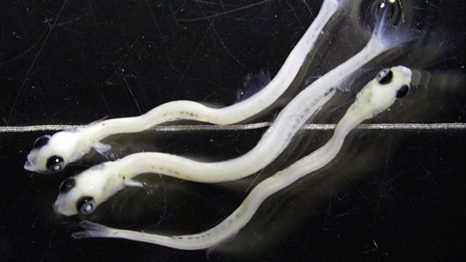
A Big Decline of River Herring – Tiny stones in fish hold clues to help restore populations
Many New Englanders still recall the vast springtime runs of river herring. Millions of the small silvery fish swam up coastal freshwater streams, returning from the sea to spawn. Two species of river herring, alewives and blueback herring, are critical components of marine food webs, right up to the fishermen on shore and at sea who harvest them. But in the late 1960s, herring populations sharply declined to as little as one percent of their historic size. Ever more-efficient commercial fishing fleets have swept them up in coastal waters. But even after states banned or limited catches, the fish have not rebounded. To expand access to historical spawning habitats, some communities have also begun removing dams. In 2014, Joel Llopiz launched a project, funded by Woods Hole Sea Grant, with colleagues at the Massachusetts Division of Marine Fisheries. The researchers are collecting and examining larval herring in four coastal river/pond systems of different sizes in Massachusetts. The systems also vary in their impacts from pollution, urban development, and agriculture. Continue reading here with more images 15:42
Participants in cooperative winter sampling program for Gulf of Maine northern shrimp announced
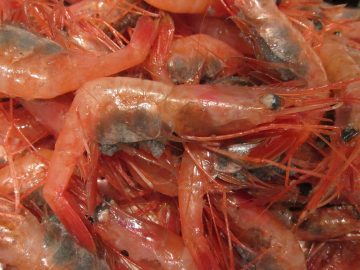 The program, coordinated by the Maine Department of Marine Resources, New Hampshire Fish and Game Department, and Massachusetts Division of Marine Fisheries, is designed to provide biological data on the shrimp fishery which is closed for the fourth year in a row. These Maine fishermen were chosen from over 60 applicants based on a random drawing of those fully qualified in each region. Preference was given to trawlers willing to participate in a test of a compound grate for harvesting. The sampling program will include the participation of 10 trawlers (eight Maine trawlers, one Massachusetts trawler and one New Hampshire trawler) and five Maine trappers fishing for eight weeks from mid-January to mid-March. Read the story here 08:15
The program, coordinated by the Maine Department of Marine Resources, New Hampshire Fish and Game Department, and Massachusetts Division of Marine Fisheries, is designed to provide biological data on the shrimp fishery which is closed for the fourth year in a row. These Maine fishermen were chosen from over 60 applicants based on a random drawing of those fully qualified in each region. Preference was given to trawlers willing to participate in a test of a compound grate for harvesting. The sampling program will include the participation of 10 trawlers (eight Maine trawlers, one Massachusetts trawler and one New Hampshire trawler) and five Maine trappers fishing for eight weeks from mid-January to mid-March. Read the story here 08:15
Awesome Underwater Footage of a White Shark Eating a Grey Seal
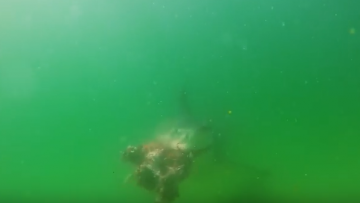 Researchers at the Atlantic White Shark Conservancy snagged video this week of a white shark swimming with her meal. That’s right, the shark is a she. And she is carrying the remains of a grey seal. The shark was later identified by Marine Fisheries Biologist John Chisholm as an 11-foot female first seen last year. The footage was captured by Greg Skomal of the Massachusetts Division of Marine Fisheries, who used a GoPro. Watch the video here 09:25
Researchers at the Atlantic White Shark Conservancy snagged video this week of a white shark swimming with her meal. That’s right, the shark is a she. And she is carrying the remains of a grey seal. The shark was later identified by Marine Fisheries Biologist John Chisholm as an 11-foot female first seen last year. The footage was captured by Greg Skomal of the Massachusetts Division of Marine Fisheries, who used a GoPro. Watch the video here 09:25
SMAST researchers employ new methods of fish geolocation
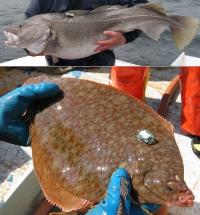 Dr. Geoffrey Cowles and his research assistants, graduate students Doug Zemeckis and Chang Liu, are partners in a multi-institution effort to tag yellowtail flounder, monkfish, and now cod to learn much more than past methods could tell them. Cod are of paramount concern in recent years because NOAA surveys have concluded that they have virtually vanished in the Northeast fishery. Zemeckis said that one of the preliminary findings is that the cod that are there are not migrating north as many believe, but are staying put. Tagged fish are not showing up in Canada, he said. Read the rest here 08:31
Dr. Geoffrey Cowles and his research assistants, graduate students Doug Zemeckis and Chang Liu, are partners in a multi-institution effort to tag yellowtail flounder, monkfish, and now cod to learn much more than past methods could tell them. Cod are of paramount concern in recent years because NOAA surveys have concluded that they have virtually vanished in the Northeast fishery. Zemeckis said that one of the preliminary findings is that the cod that are there are not migrating north as many believe, but are staying put. Tagged fish are not showing up in Canada, he said. Read the rest here 08:31
Fishing data collection grants announced
![]() Data on commercial fishing is almost always described as inadequate for making sound decisions about quota and regulations. States and the federal government have formed the Atlantic Coastal Cooperative Statistics Program (ACCSP) to conduct research into data collecting. Read more here 11:25
Data on commercial fishing is almost always described as inadequate for making sound decisions about quota and regulations. States and the federal government have formed the Atlantic Coastal Cooperative Statistics Program (ACCSP) to conduct research into data collecting. Read more here 11:25
Trawlers clean out coastal herring
CHATHAM — Like many who represent Cape and Islands fishermen, Alex Friedman, the president of the Dukes County Fishermen’s Association, started getting calls a week ago that eight large vessels, operating in pairs, were towing large nets the size of football fields between them and cleaning out the herring just a few miles east of Cape Cod. Read more here 14:35
Worried about the Cape’s striped bass? Look in the mirror. – A call for anglers’ self-regulation
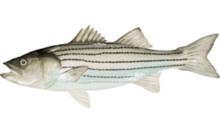 Once again this summer, a striped bass honey hole off the coast of Chatham will make it difficult for Capegoers to appreciate the severity of the species’ overall decline. Since 2009, the Eastern Seaboard’s most prized game fish has arrived to these waters in droves. No doubt, recreational fishermen, myself included, have taken advantage. capecodtimes Read more here 10:26
Once again this summer, a striped bass honey hole off the coast of Chatham will make it difficult for Capegoers to appreciate the severity of the species’ overall decline. Since 2009, the Eastern Seaboard’s most prized game fish has arrived to these waters in droves. No doubt, recreational fishermen, myself included, have taken advantage. capecodtimes Read more here 10:26
Different states with different rules sting SouthCoast fluke fishermen
![]() POINT JUDITH, R.I. — April 9 was a good day for Tony Borges, captain of the Sao Paulo. He only had to throw 100 pounds of fish overboard. That’s 100 pounds of fluke, roughly 33 individual fish, most of which were already dead. Read more here 08:55
POINT JUDITH, R.I. — April 9 was a good day for Tony Borges, captain of the Sao Paulo. He only had to throw 100 pounds of fish overboard. That’s 100 pounds of fluke, roughly 33 individual fish, most of which were already dead. Read more here 08:55






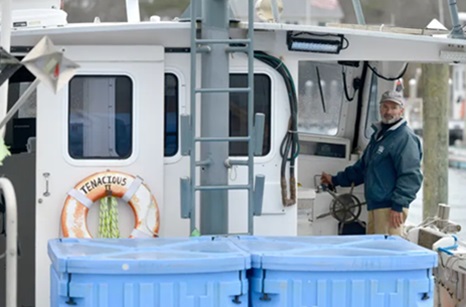



























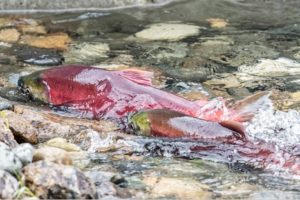
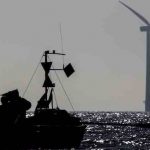
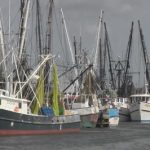

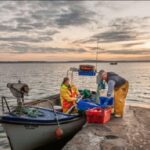
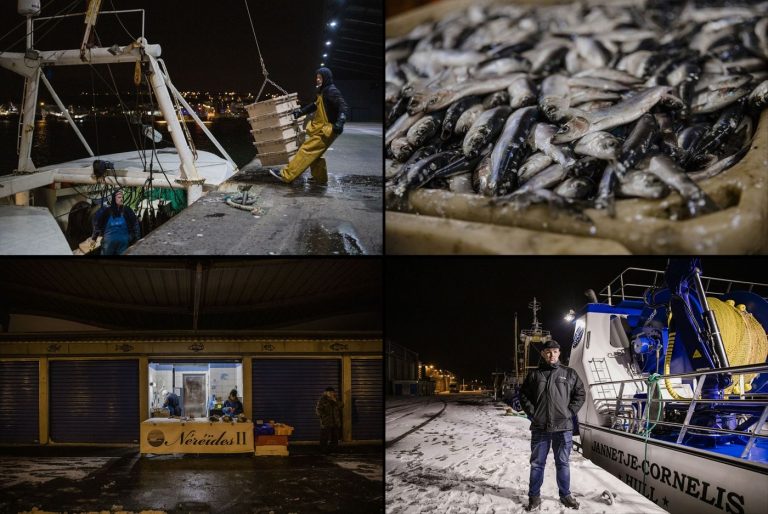


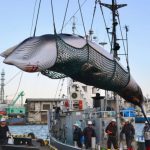



New Proposed Measures to Provide Needed Protections to Whales and less Economic Impact on Lobstermen
NOAA FisheriesNMFS is proposing to make additional changes to its Atlantic Large Whale Take Reduction Plan to help reduce large whale serious injuries and deaths due to entanglement in fishing gear. Click here to read more about proposed measures. The deadline for providing public comments on these measures is November 21. 17:40 The PR version is hereShare this post